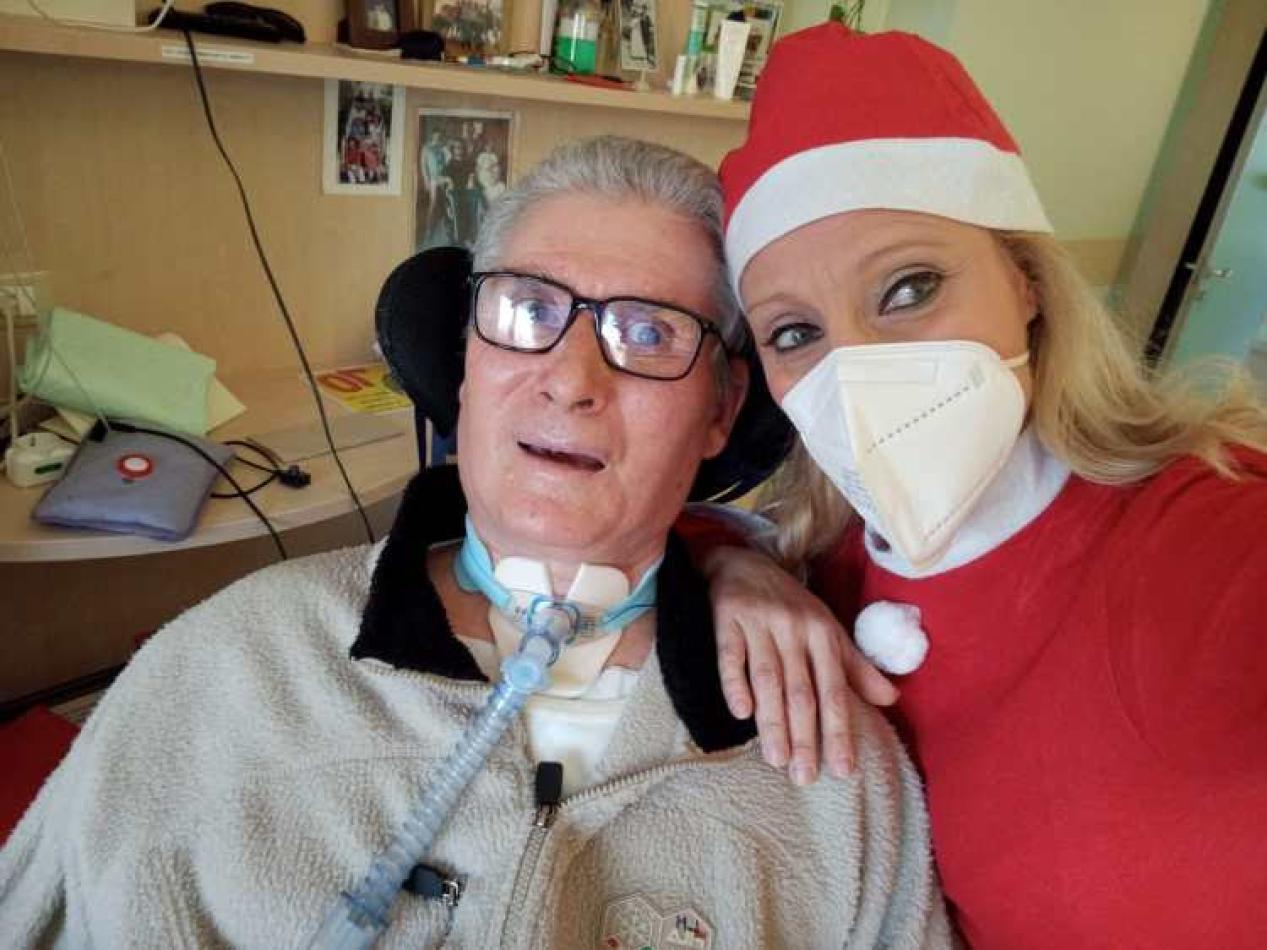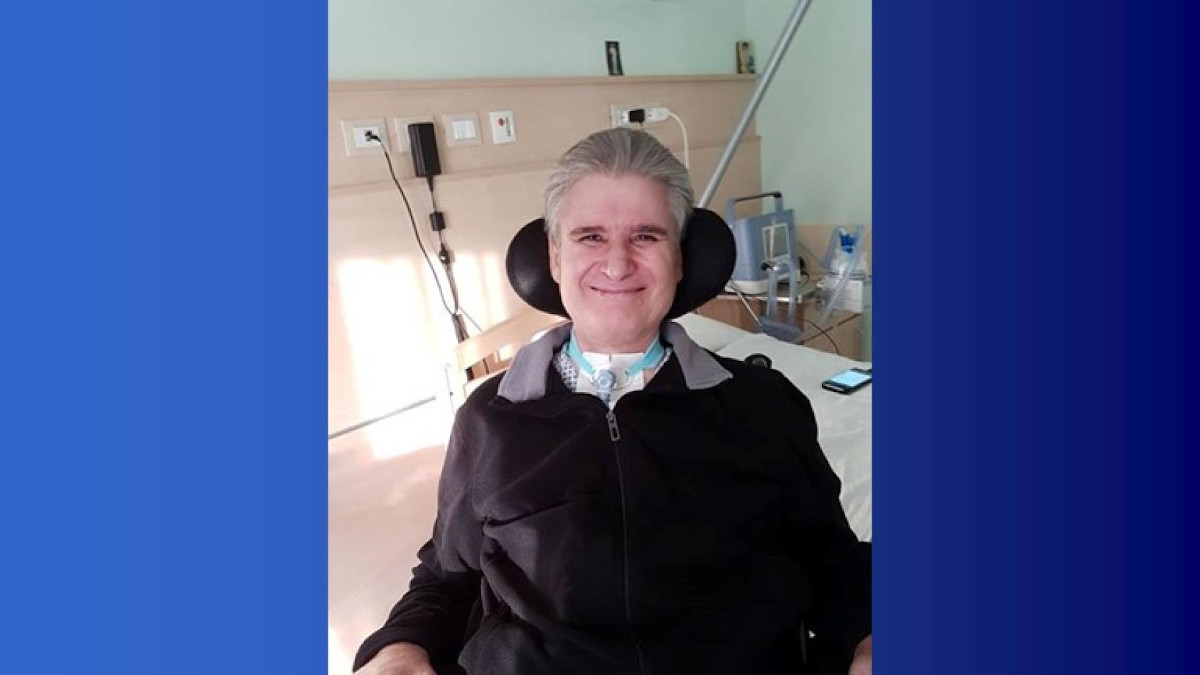Daniel Comboni
Comboni Missionaries
Institutional area
Other links
Newsletter
Saturday, June 14, 2024
Father Manuel João Pereira Correia, a Comboni missionary, has been living for 14 years with amyotrophic lateral sclerosis (ALS), a disease he tries to tackle with missionary spirit, serenity and the “gift of a smile”. Br Tomek Basinski, a Polish Comboni missionary, gave him a short interview, which we publish below.
“I love life and I like to repeat that life is beautiful!”
How did your missionary vocation come about?
My missionary vocation... was born with me! Ever since I was a child, I felt the desire to be a priest, perhaps due to the influence of my mother who, when I was very small, would ask me during Mass: “Manuelino, wouldn’t you like to be a priest?”. This desire grew with me, so much so that. when they asked me what I wanted to be when I grew up, I would answer with conviction: ‘I want to be a priest! My colleagues and some family members laughed at me, but the dream remained alive.
When I was ten years old, in primary school, a Comboni missionary came and spoke to us enthusiastically about the missionary vocation. When he finished his speech, he asked us who wanted to go to Africa with him. No one raised their hand. Not even me, out of shyness. The teacher, who perhaps sensed that I could be a ‘candidate’, called me during the break and introduced me to that vocational promoter. A few months later, I was accepted into the seminary. And so, my vocation as a Comboni priest was born.
I must emphasise that the decision to give my definitive ‘yes’ to the Lord did not come from a clarification of my doubts, but from an intimate conviction that, even if the future revealed that my decision had been rash or even wrong, the Lord would give meaning to my story. This conviction became a ‘promise of meaning’ for me: “I will always be with you to give meaning to your life!”. This promise has always accompanied me and illuminated the difficult moments of my life.
A few days before my ordination, my father revealed to me that, at the moment of my conception (I am the first-born son), my parents had made a kind of prayer or ‘consecration’: “O Lord, if our first child is a boy, we offer him to you as a priest!”
He added that he had not told me this before so as not to condition me in my choice.
There is also another confidence of my mother's that moved me deeply, but I keep it jealously only for myself! In a way, I see myself in Jeremiah’s vocation, with his doubts, fears and shyness, but called by God from the womb!
You worked in different communities and countries until something happened in 2010 that forced you to return to Europe and stay there. What happened?
I started having difficulty walking and I wondered what it was. At first, I thought it was lack of exercise. In the evenings, after I finished my activities, I started cycling. When it became clear that it was something else, I went to see a neurologist, who advised me to return immediately to my country, Portugal, for tests and gave me a letter in a sealed envelope to present to a specialist. When I got home, I opened it and read the verdict. Probable diagnosis: amyotrophic lateral sclerosis (ALS). In Lisbon, this diagnosis was confirmed to me. When I asked the doctor what the evolution of the disease would be, he replied: “Very simple, first you will walk with crutches, then in a wheelchair, then...”.
I thanked him for his frankness and left. I went back to Africa (Togo) to finish the last months of my service as head of the Comboni missionaries in West Africa (Togo, Ghana and Benin) and, at the end of the year, I returned to Europe.
How did you react when you got the doctor’s diagnosis?
The first night I cried a little, I confess, but then the Lord gave me a grace I did not expect: a great serenity, which has always accompanied me. Of course, at first, I wondered why this misfortune had happened to me, but I immediately gave myself the answer: “And why shouldn’t it have happened to me? Am I privileged?’
I often thought about when I would be completely trapped in my body, but one certainty gave me peace: “I will not be alone. The Lord will be a prisoner within me!”. I also thought about the possibility of being completely isolated from external reality, but another conviction grew within me: “I will always have the possibility of living in the inner world that dwells in the cathedral of my heart!”
Your ministry has certainly changed as your illness has progressed…
Yes, absolutely. At first, I expected to live, at most, a few years. In fact, I have seen friends die of the same illness. Since the Lord has given me a few more years (more than twelve years have passed since that moment!), I thought I would give my small contribution in the field of ongoing formation of the confreres, creating a blog and sharing formation material with them. As long as my situation allowed it, I offered to collaborate with some groups, giving my testimony and cultivating friendships.
You once said that your wheelchair has become a pulpit for you.... What did you mean by that?
I truly believe that my wheelchair is the pulpit God has given me to proclaim the Word. I believe that our ‘cross’ is the most appropriate place to proclaim the Word. I see myself as the prophet Jonah in the belly of the whale, leading me where God wants me to go. I sail in the sea of life, between its two shores. From one eye of the whale I look at life on this shore, from the other eye I glimpse the other shore that awaits us, in the mist of faith and hope.
Every time I think of you, I see a serene and smiling man. Where does this joy of yours come from?
From the serenity that has accompanied me since the beginning of my illness, and this serenity is a gift from God. I am sure of it, because I was quite worried about health problems, which I did not lack in the mission. Every day, I ask the Lord for a smile.
As of 2018, you are completely paralysed. How do you experience dependence on others?
It is my way of living my vow of poverty: being in need and having to ask for everything! But it is also a way of cultivating gratitude for every little thing. Besides thanking God for all the people who generously help me, I always try to reciprocate with a smile on my lips and a blessing in my heart. After all, it is very easy because everyone loves me and pampers me!
You are motionless, yet you manage to communicate with others, as you do now with me.
Yes, I communicate mainly with my eyes, the only part of my body that I can still move. With my eyes I write, thanks to a computer with special software that ‘reads’ the movements of my eyes. One of the many wonders of technology!
How do you live your missionary vocation?
I love life and I like to say that life is beautiful! I try to transmit this sense of wonder to the people around me. I continue to be interested in and follow the life of our world, society, Church and mission. I do this out of passion and to continuously update my blog (www.comboni2000.org).
Sometimes people who experience illness and suffering feel sorrow and anger towards God. What is your relationship with God today?
In sickness I discovered God’s generosity! For some years, it impressed me that the Lord visited me like a thief. I felt it was a painful visit. Spontaneously, I asked him not to visit me like a thief, but to come like a friend, and knock on my door, even as an inconvenient friend, to the point of forcing me to open it, either out of friendship or force! When the Lord visited me with illness, I spontaneously exclaimed: “Lord, you are a thief!” Every time, he took something away from me. Then, I discovered that he is a very special thief: He never takes anything away from us without leaving us something more precious!
What would you say to people who have lost hope and are unhappy in their suffering and illness?
I would say that life is always an opportunity! Since the beginning of my illness, a conviction has accompanied me: life never closes one door without opening another. But we are often so stubbornly attached to this closed door that we do not realise that another one is opening in the meantime. In the beginning, illness was for me like a dark wall that completely cut off all horizon perspectives. The conviction that life is always an opportunity led me to look at this wall with different eyes and to glimpse a door – hitherto invisible to my eyes – that offered me a new vision of life, deeper, wider and more beautiful, I dare say! Naturally, faith helped me in this process. Of course, there are particularly tragic situations that are difficult to accept and handle. For the believer, it is the hour of hope and faith in the triumph of life, of which the cross and death are the gestation. To the non-believer, I would say to trust the instinct of the beauty of life. This, too, is a path of hope that leads us, albeit unconsciously, to Life!
Interview by Br Tomasz Basiński
Comboni missionary





